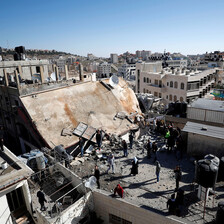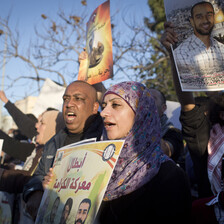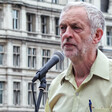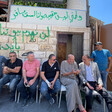The Electronic Intifada Jerusalem 11 November 2014
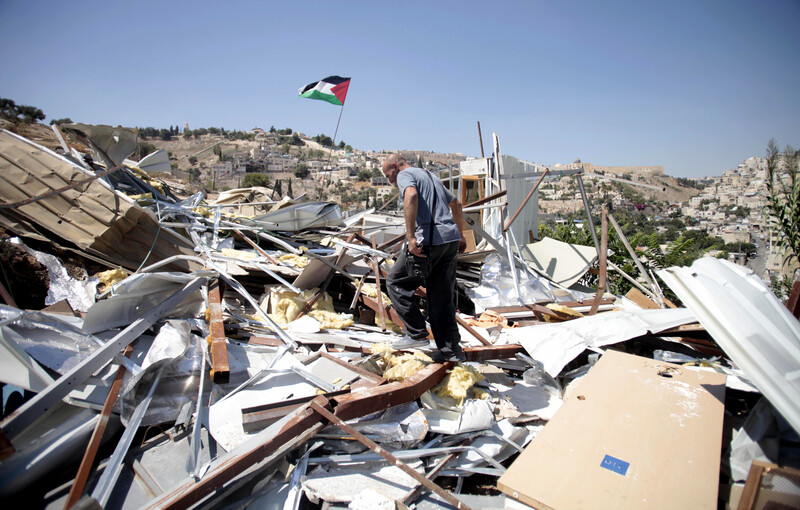
Khaled al-Zeer at the site of his destroyed home in the Silwan neighborhood of occupied East Jerusalem on 26 August 2013.
APA imagesIsraeli occupation forces have knocked down the home of Khaled al-Zeer and his family two times in as many years.
The latest demolition occurred on 29 October, when Israeli authorities sent bulldozers to the small flat that Khaled, his wife Areej and their six daughters shared in the al-Abbasiyeh quarter of Silwan, a neighborhood of occupied East Jerusalem.
Al-Zeer, 40, was alerted by a friend early that morning to the arrival of the demolition team working for the Jerusalem municipality and accompanied by armed police. He abruptly woke up his daughters and sent them to his parents’ home.
“It took the girls several months to shake off the trauma caused by the demolition of our former home last year and I did not want them to witness another demolition,” al-Zeer said.
That previous demolition had occurred in August 2013. The reason cited for the demolition was one with which Palestinians are all too familiar. Al-Zeer had built his home without getting permits from the Israeli occupation authorities, who routinely deny such permission to Palestinians in Jerusalem.
“Unbearable”
That demolition had occurred despite a court injunction which was supposed to put the demolition on hold. Following it, the family had to live temporarily in a cave.
“Life in the cave was unbearable,” said Nagham, Khaled’s ten-year-old daughter. “Rocks were falling on us all the time and there were a lot of insects. We couldn’t study, eat or sleep properly. We particularly feared for my sister Nada, who was six months old back then.”
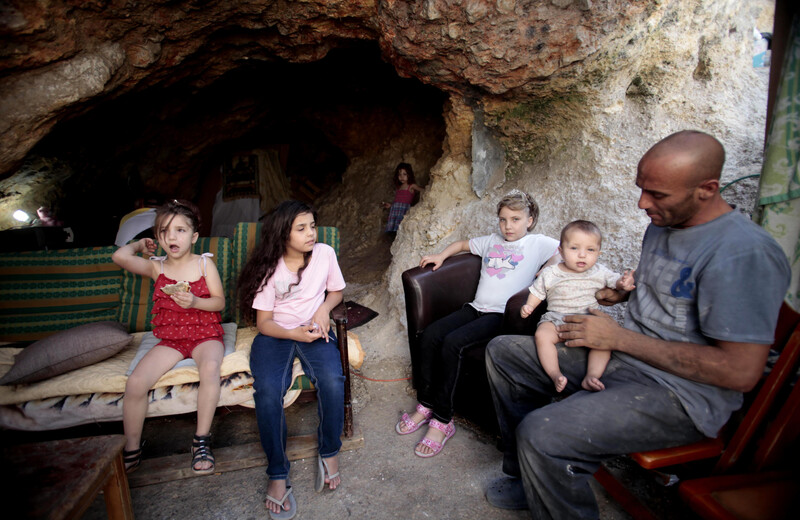
Khaled al-Zeer with his children at the cave in which they sought shelter after their home was destroyed on 26 August 2013.
APA imagesA metalworker by profession, al-Zeer tried to make the cave habitable. But the Jerusalem municipality obtained a court order forbidding him to undertake any work on the cave, claiming that it was a “historical site.”
As winter approached, Khaled built a small home on the ruins of the previously demolished one. He also built a barn for the family’s horse and shelter for their sheep. All were demolished on 29 October this year.
“They bulldozed everything,” al-Zeer said. “They even uprooted the fifteen trees I had planted outside. They confiscated our furniture and my work equipment.”
The demolition was captured on the above video taken by the Wadi Hilweh Information Center, a Palestinian human rights organization based in Silwan. The video shows that vehicles made by three corporations — Volvo of Sweden, Hyundai of South Korea and Iveco of Italy — were used in the demolition.
As the bulldozers arrived, al-Zeer argued with Israeli police, who promptly arrested him, along with his brother. They are among 900 Jerusalemites to have been arrested by Israeli forces since July.
“They burned a cigarette on my hands”
“I was also beaten up in detention, electrocuted and they burned a cigarette on my hands before releasing me on the same day,” Khaled al-Zeer said.
He then erected a protest tent across the street from his demolished home. He also set up a container for his animals. Both the tent and the container were removed by Israeli occupation forces on 3 November.
More than 48,000 homes have been destroyed by Israel in the West Bank — including East Jerusalem — and the Gaza Strip since 1967, according to the Israeli Committee Against House Demolitions.
Victims of these demolitions sometimes receive media attention when they occur. Yet hardly any attention is paid to the long-term consequences of being made homeless as a result of state violence. Statistics cannot describe the suffering involved.
This time around, Khaled al-Zeer and his family have moved into his parents’ home. His daughters speak of the experience in a way that belies their youth.
“Obviously, I’m not really comfortable here,” said Rasha, Khaled’s eight-year-old daughter, referring to her grandparents’ home. “I miss my home, my bed and my toys and we know that we cannot stay here forever.”
“Grew up too fast”
As the girls’ mother, Areej, said, “They have gone through so much trial and pain in the last year that they grew up too fast and barely had time to live their childhood.”
Khaled al-Zeer refuses to leave Silwan. He argues that the Palestinian community in the neighborhood need greater support than they have received to date.
“My great grandparents lived here in Silwan,” said al-Zeer. “This is our land and we will cling to it, even if we are forced to rebuild each time they demolish.
“But I feel that here in Silwan, we are left alone, fighting Israel on our own. Everyone pays lip service to Jerusalem, but on the ground, no one is really doing anything for us. And to tell you that my economic situation is rough is an understatement. Even my car was confiscated a few months ago because of unpaid taxes to the occupation municipality.”
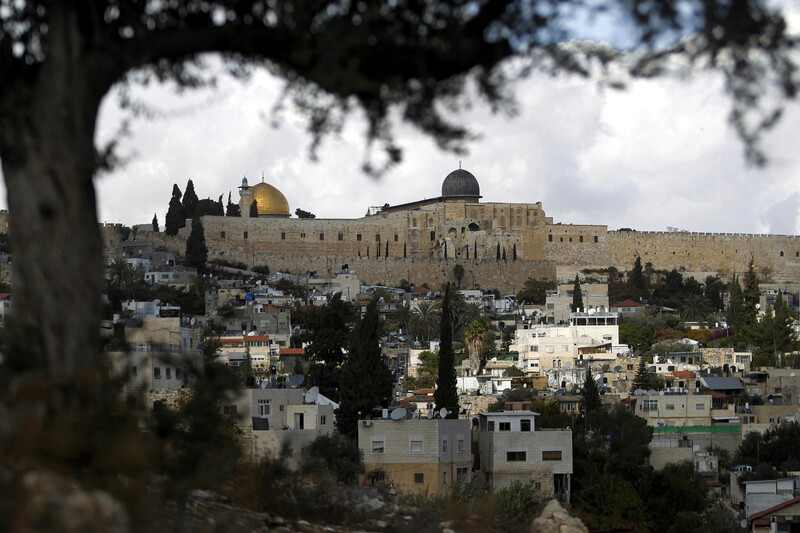
The Dome of the Rock and al-Aqsa Mosque seen from the Silwan neighborhood of occupied East Jerusalem on 3 November 2014.
APA imagesThe distinctive Dome of the Rock near the al-Aqsa Mosque — a site being targeted by right-wing Zionists — can be seen from the environs of al-Zeer’s demolished home.
Israel is trying to force Palestinians out of Silwan so that they can be replaced with Jewish settlers. Israeli authorities threaten to demolish large numbers of Palestinian buildings to make way for the City of David, an archeological theme park honoring a king who is reputed to have spent time in the area several millennia ago.
More demolitions have occurred since al-Zeer’s home was destroyed. One week later, two buildings belonging to the Abu Rajab and Abu Sbeih families were knocked down.
Several Palestinian buildings in Silwan were also taken over by Israeli settlers during September and October.
“We don’t feel safe”
“Silwan has been transformed into a military zone,” said Khaled al-Zeer. “The Israelis are using all possible methods to intimidate us and drive us away, including traffic stops and fines, the property taxes that we cannot pay and endless provocations by settlers.”
One day after the al-Zeer family’s home was destroyed, Israeli forces raided the home of Mutaz Hijazi, a former political prisoner from Silwan, and shot him dead. The young man was named by Israel as a suspect in the attempted assassination of Yehuda Glick, an American-born settler who leads of a religious movement which seeks the destruction of the al-Aqsa Mosque and Dome of the Rock.
Khaled’s daughter Nagham added: “The heavy presence of soldiers scares us. There are soldiers and police everywhere in the neighborhood. I have to hold my sisters’ arms each time we go to school because we don’t feel safe walking alone.”
Some Zionist organizations such as Ateret Cohanim have been known to take advantage of the poverty which most Palestinians face by buying their homes so that they can be handed over to Jewish settlers.
As these groups often recruit Palestinian collaborators, their efforts can prove divisive. Many locals believe that the Israeli authorities and the Zionist groups working with them are trying to undermine the strong sense of community among Palestinians in Silwan.
Al-Zeer believes that the Palestinian Authority should not negotiate with Israel. Such negotiations are exploited by Israel to buy time so that it can further its plans to Judaize East Jerusalem through the ethnic cleansing of Palestinian neighborhoods.
“Silwan is facing an unprecedented attack,” said al-Zeer. “But nothing justifies selling your home. We have no choice but to resist and stay on our land.”
Budour Youssef Hassan is a Palestinian anarchist and law graduate based in occupied Jerusalem. She can be followed on Twitter: @Budour48.
